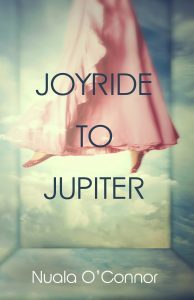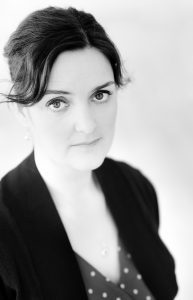Virtual Tour – Joyride To Jupiter – Nuala O’Connor
I’m a big fan of Irish writer Nuala O’Connor, whose thirteenth (!) book is out now. Joyride to Jupiter is her fifth short story collection, but several of the stories will be familiar to those who’ve kept an eye on recent significant Irish writing anthologies (Town and Country from Faber; the Irish-focused issue of Granta). She also writes novels and poetry, and constantly has wise things to say about this business (and art) of writing. So I asked her to share some of them…

This is collection number five of short stories for you, not counting the ‘Of Dublin and Other Fictions’ chapbook – how has your writing process changed since starting out?
I have slowed down a bit, though to be honest, I am still mostly in a tearing rush: to get to the desk, to write, to get onto the next thing. It’s inbuilt in me to go at things fast.
But I’ve consciously worked on slowing down. To flesh out the work more, to linger over ideas/inspirations rather than harry them into being. To try not to be hysterical about time, which I always want more of. Also, I have fewer story ideas these days, and none for poems. Novels, however, are breeding in me like rabbits.
How many of the stories were commissioned (I imagine ‘Joyride to Jupiter’ was, for one) and how many did you write ‘for yourself’?
‘Joyride to Jupiter’ began organically, actually. I had no deadline. I started writing it on a bus in Croatia where I was a guest at a short story festival. But then I had to finish it to a deadline when I was asked for something for the Faber anthology. Luckily the timeframe was long. I find tight deadlines hard – I prefer for stories to grow at their own pace, whatever that may be.
Ten of the nineteen stories were commissions but only one was prescriptive – it had to be about a getaway as it was for the Irish Times’ summer series of stories. I knew I had a notebook from a trip to Spain that I hadn’t used anything from, so I delved into that and wove my fertility traumas into those Spanish snippets and that became the story ‘Storks’. The deadline was alarmingly short but I was happy with how the story turned out, which is a rarity. Thank goodness for untapped notebooks.
All of these stories have been previously published in anthologies and journals, some translated – do you spend much time on that ‘business’ side of writing, sending work out or thinking about where might be a suitable home for your stories?
In the last few years I have been neglecting that end of things, mainly because I haven’t had many stories to offer. I’m so consumed by writing novels that there isn’t the space in my schedule to write stories unless someone comes looking for something. I couldn’t say no to Granta, for example, just because I’m disgustingly protective of my novel-writing time.
Now that I’ve cleared a bit of space in my schedule, to promote Joyride to Jupiter, I find I’m writing short fiction and flash more consistently again. I’m trying to take my time over one story that may, in fact, end up being a novel because the subject matter is so juicy. But, for the moment, it’s a fragmented story and I’m giddily happy writing it.
Do you revise these stories before they make their way into a collection or do you stay faithful to the first-published version?
I revise like a madwoman so the stories, while not hugely altered, are different to the first-published version. Frank O’Connor was a consummate tinkerer – I’m the same. I read aloud, I use my thesaurus, I aim for clarity. I love the distance that editing a collection allows. These stories span seven years or so. So getting to rework some of them has been very enjoyable.
Who reads your work before it goes out into the world?
My writing group, The Peers, but finished stories and poems only – I don’t bring work in progress, or novel chunks, to my group. Then my agent sees my stuff, then whichever editor. I don’t have a writing buddy or first reader, though I give book proofs to my friend Karen, my husband Finbar, and my sister Úna as soon as I get them and I like that those three are my first ‘book’ readers.
Flash fiction is a great love of yours, and several of these stories are flash pieces. What about the form appeals to you?
It suits a writer like me who is addicted to concision, brevity and precise language. I love that it’s a hybrid, poetry-prosey form. I love that it has visible edges and, when done well, it gives the gut-punch I crave as a reader.
You’ve also been working on novels these past few years – do stories serve as a welcome break from larger projects? What are the challenges of each?
I wrote my first novel in 2003 and didn’t get it published until 2010. That seven year hiatus messed with my novel confidence, so I continued to write stories. I love both, though I’m more naturally a short story writer. I like the day-in, day-out slog of novels, the sense of A Big Project, the working out of plot (sadly there has to be one), and the weaving of strands. The vital, pressing nature of stories mean they are more difficult to pull off, but I like the challenge of them, the novelty. I like newness – in life experience, in surroundings – so the renewal that the story offers thrills me.

This is – I believe – the first short story collection and second book under the Anglicised version of your name. How is life as Nuala O’Connor treating you – is there any sense of an identity crisis or a betrayal of the oul’ Irishness?
There was a shit-storm on Twitter when I reverted to my birth name, from a bunch of Irish writers whom I shall not identify. Betrayal of identity, blah-fucking-blah. These people don’t even know me; they’d be better off writing books rather than bitching about what I do, imo…
My editors in Penguin USA and Penguin Canada, and my agent, thought my books would be better served if potential readers could read, remember and pronounce my name. Very sensible. For consistency, seeing that Miss Emily did well, we agreed that I should continue as Nuala O’Connor, which is my name. (I went to a Gaelscoil and my name was translated when I entered it, as happens. I studied Irish in uni up to MA. Hence the ‘Ní Chonchúir’.)
Which writers have impressed you recently?
Our own Mary O’Donnell is a wonderful writer – I am currently reading her re-issued first novel, The Light Makers, launching in Dublin 18th July at the IWC. It’s so wise, and also beautifully written and imagined. I recently loved books by American writers Jennifer Tseng and Danielle Dutton, and English writer Sarah Perry. Other recent reads from writers who always impress me were by Alison MacLeod, Mia Gallagher, Jan Carson and June Caldwell. Super writers, all.
If you could change one thing about ‘the Irish literary scene’, what would it be?
Male domination. The boys’ club. It makes me crazy. Yes, the women are great for mutual support, but we are side-lined constantly in favour of male writers (by the men themselves and by the media). People will say this is not true and cite examples of women who have risen to the top, but they are the exceptions. In general, our culture supports male artists to the detriment of female. This is a fact.
Nuala O’Connor AKA Nuala Ní Chonchúir was born in Dublin; she lives in East Galway. Her fifth short story collection Joyride to Jupiter was published by New Island in June 2017. Penguin USA, Penguin Canada and Sandstone (UK) published Nuala’s third novel, Miss Emily, about the poet Emily Dickinson and her Irish maid. Miss Emily was shortlisted for the Bord Gáis Energy Eason Book Club Novel of the Year 2015 and longlisted for the 2017 International DUBLIN Literary Award. Nuala’s fourth novel, Becoming Belle, will be published in 2018.



